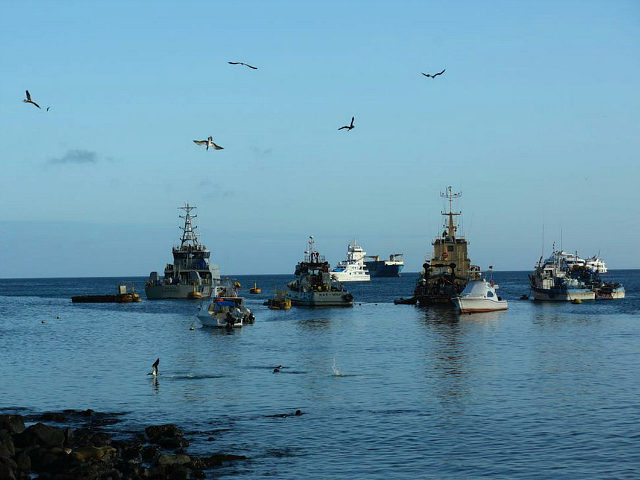Ecuador’s navy said on Tuesday that nearly 150 fishing boats from a largely Chinese fleet operating near the ecologically sensitive Galápagos Islands have turned off their tracking systems to prevent authorities from monitoring their activities.
Of the estimated 325 vessels fishing in the waters just outside the Galápagos, 149 have cut off their communications systems in recent months, Ecuador navy commander Rear Admiral Darwin Jarrin said at a press briefing Tuesday according to Reuters.
“In this period, 149 ships have turned off their satellite systems … we know the name[s] of the ships,” he said.
The crews of some fishing boats have also changed the name of their vessels in an attempt to confuse authorities monitoring them, the navy commander added.
The intentionally evasive actions of the Chinese fishing vessels represent “a breach (of protocol) on the high seas because they do not want us to know what they are doing and the activities they carry out,” Ecuador Defense Minister Oswaldo Jarrin said at the news conference.
The defense minister said that turning off satellite equipment violates rules set by Regional Fisheries Management Organizations (RFMOs), a group of international agencies promoting sustainable fishing worldwide.
The predominantly Chinese fishing fleet has operated just outside the Galápagos Islands marine preserve — located off the coast of Ecuador within the country’s exclusive economic zone — for months. In late July, Ecuador’s navy said it was “on alert” over the fishing fleet as it inched “very close” to the edge of Ecuador’s exclusive economic zone, according to the Galápagos Islands’ Gov. Norman Wray.
“[L]ong fishing lines from the Chinese vessels could be drifting into [Ecuador’s] exclusive economic zone,” Luis Villanueva, a member of the Pew Bertarelli Ocean Legacy Project, said at the time. Though yet unproven this summer, China’s illegal fishing both within Ecuador’s exclusive economic zone and inside the Galápagos marine preserve — protected as a UNESCO world heritage site for its sensitive biodiversity — has been documented in years past.
In August 2017, Ecuador authorities seized a Chinese vessel caught illegally fishing within the boundaries of the Galápagos Marine Reserve. Authorities arrested 20 of the boat’s crew members, who were found with 6,600 sharks on board, including near-extinct or endangered species, such as hammerhead sharks.
On August 2, the U.S. State Department issued a statement supporting Ecuador as it monitored China’s hundreds-strong fishing fleet near the Galápagos this summer.
“We firmly support Ecuador’s efforts to ensure [People’s Republic of China] PRC-flagged vessels do not engage in illegal, unreported, and unregulated fishing and stand with States whose economies and natural resources are threatened by PRC-flagged vessels’ disregard for the rule of law and responsible fishing practices,” U.S. Secretary of State Mike Pompeo said.
While Ecuador seeks to discourage illegal fishing within its exclusive economic zone, it also likely hopes to avoid confrontation with China, “its largest financier and a major market for its shrimp export business,” according to Reuters.

COMMENTS
Please let us know if you're having issues with commenting.